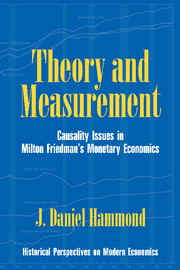Book contents
- Frontmatter
- Contents
- Acknowledgments
- Introduction
- 1 Theory and Measurement at the National Bureau
- 2 Origins of Friedman's Marshallian Methodology
- 3 Origins of the Monetary Project
- 4 Critiques from Within the National Bureau
- 5 Post Hoc Ergo Propter Hoc: Part I
- 6 Reactions to the Monetary History
- 7 Post Hoc Ergo Propter Hoc: Part II
- 8 Friedman and His Critics on the Theoretical Framework
- 9 The Great Depression
- 10 Measurement without Measurement: Hendry and Ericsson's Critique
- Conclusion
- Appendix
- Bibliography
- Index
7 - Post Hoc Ergo Propter Hoc: Part II
Published online by Cambridge University Press: 16 September 2009
- Frontmatter
- Contents
- Acknowledgments
- Introduction
- 1 Theory and Measurement at the National Bureau
- 2 Origins of Friedman's Marshallian Methodology
- 3 Origins of the Monetary Project
- 4 Critiques from Within the National Bureau
- 5 Post Hoc Ergo Propter Hoc: Part I
- 6 Reactions to the Monetary History
- 7 Post Hoc Ergo Propter Hoc: Part II
- 8 Friedman and His Critics on the Theoretical Framework
- 9 The Great Depression
- 10 Measurement without Measurement: Hendry and Ericsson's Critique
- Conclusion
- Appendix
- Bibliography
- Index
Summary
Introduction
The most famous encounter of Friedman with another economist over the causal significance of his evidence on the lag of monetary policy was with James Tobin in the May 1970 Quarterly Journal of Economics. In some respects this was a replay of the exchanges ten years earlier with Culbertson and Clark. But no doubt because of Tobin's greater stature than Culbertson in the profession, because of the growth of Friedman's stature and notoriety in the dominant Keynesian milieu over the ensuing decade, and the widely held belief that money doesn't matter, the Tobin–Friedman exchange came to overshadow the earlier one between Culbertson and Friedman. Culbertson was no Keynesian; his methodological strictures against Keynesian consumption and money demand functions were just as severe as those against Friedman's lag doctrine. (See Culbertson, 1968, ch.5.)
Culbertson had reacted to one report of Friedman's empirical evidence on the lag, his 1959 Joint Economic Committee testimony, and two of his policy proposals, “A Monetary and Fiscal Framework for Economic Stability” (1948b) and A Program for Monetary Stability (1960). By 1970, when Tobin made his post hoc critique, Friedman had published three other statements of the fruits of his and Schwartz's empirical research that were receiving great attention. These were, with Schwartz as coauthor, “Money and Business Cycles” (1963a) and the Monetary History (1963b) and, with Friedman as sole author, “The Monetary Studies of the National Bureau” (1964a).
- Type
- Chapter
- Information
- Theory and MeasurementCausality Issues in Milton Friedman's Monetary Economics, pp. 124 - 139Publisher: Cambridge University PressPrint publication year: 1996



